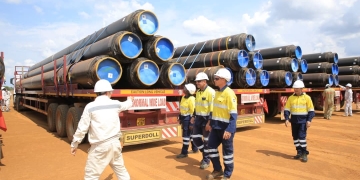
National agencies and oil companies have set out plans that are aimed at ensuring that after oil activities especially in the protected areas are done, their biodiversity will not only be restored but made better.
The plans laid out under the Tilenga Biodiversity Program, are based on three pillars; avoid, minimize and restore, which are aimed at not only ensuring minimal impact, but also restoring the sites to their original state, and if possible, expanding the biodiversity.
This comes amidst increasing pressure from local, regional, and international organizations calling for the abandonment of the oil and gas development activities, especially the crude export pipeline, over environmental issues.
Apart from water bodies, vegetation, and scenic terrain, the Albertine Rift Valley is home to more than 144 mammals including rare species like the Nubian Giraffe, Lion, African Elephant and Eastern Chimpanzee, and more than 450 birds. This, in addition to the fisheries resources, makes the area important for tourism and people’s livelihoods.
Under the Tilenga Biodiversity Program, TotalEnergies commits to “ensure positive outcomes for biodiversity and communities by applying the mitigation measures “avoid, minimize and restore” impacts. And where they fail to restore the biodiversity, the company will compensate with other activities.
Philippe Groueix, the General Manager of TotalEnergies EP Uganda, says that this is aimed to continue their commitment to ensuring maximum benefit for the country and the communities, not only from oil and gas revenues.
“Furthermore, we shall compensate for impacts that are likely to persist to achieve positive outcomes for wildlife and people within the landscape. We aim to achieve this by working together in partnership with communities, mandated institutions, conservation organizations, and civil society,” says the commitment of the company.
The activities will include removing evasive vegetation from the protected areas, alternative livelihoods to reduce human-wildlife conflict and support to law enforcement activities, and working with the Uganda Wildlife Authority and the Petroleum Authority Uganda.
The company will also help in conservation measures for forests and their neighborhoods targeting 10,000 hectares of natural forest and restoration of 1,000 hectares along the Budongo-Bugoma corridor, in conjunction with the National Forest Authority.
Other activities are; working with UWA to protect and maintain savanna areas around Bugungu Wildlife Reserve, including supporting diversification of livelihoods to reduce dependency on natural resources in the reserve.
The company will also work with the Ministry of Water and Environment and the host communities to help build more resilient wetland ecosystems, manage and restore wetlands through community-based initiatives.
The Wildlife Conservation Society, WCS, has been monitoring the developments and possible impacts on the environment and advising the companies on how to mitigate the measures. Simon Takozekibi Nampindo, the WCS Country Director, urged the companies to improve their openness about their activities and data collected, for transparency and access by other relevant organizations.
He says they are now studying the impact of oil and gas activities on the animals, regarding migration and reproduction, but adds that for now what is clear is that animals, like elephants, can move away for a few kilometers and come back.
The National Environment Management Authority NEMA hailed the initiatives and urged the company to stick to the provisions.
However, NEMA Executive Director Akankwasah Barirega, said the companies should work with PAU to compensate for all the impacts where biodiversity will now have been restored, including the land that will permanently be occupied by facilities like oil pads.
NEMA hopes that the interventions by TotalEnergies under this program shall be clear and distinguishable and not overlap with the mandates and functions or work of various institutions such as the Uganda Wildlife Authority, and the National Forestry Authority, among others.
Akankwasah wants these programs to be used to counter the campaign by activists who, he says, have portrayed Uganda’s petroleum development efforts in a negative light in international media. Joseph Kobusheshe, Director of Environment, Health, Safety, and Security at PAU said the international activism against the country’s nascent oil and gas industry is based on a lack of knowledge, which is unfair.
The companies say that after exploration is complete, only less than o.5 percent of the land area occupied will be retained and the rest returned to the government.
On government land lost to oil and gas activities, Dr. Kobusheshe says the plans are on and that cabinet will soon be informed on how the companies and PAU intend to go about it.

















